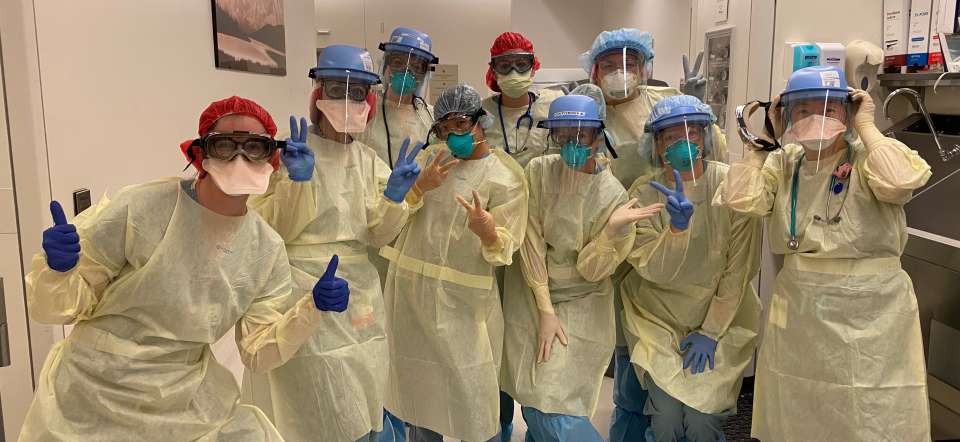Goals & Objectives

The goal of the training program in Neonatal-Perinatal Medicine at UCLA is to provide fellows with instruction and evaluation in competencies that include: Patient care, medical knowledge, professionalism, system-based practice, practice-based learning and improvement and interpersonal and communication skills. Fellows will learn the fundamentals of clinical diagnosis and management of problems related to the health and well-being of the fetus and neonate. Fellows will develop competence in the management of critically ill neonates which include techniques of neonatal resuscitation, venous and arterial access, endotracheal intubation, preparation for transport, the actual transport of critically ill infants, ventilatory and cardiovascular support, continuous monitoring, temperature control, nutritional support, and general principles of critical care. The curriculum in Neonatal-Perinatal Medicine at our institution reflects our commitment to provide the community of pediatrics with academic neonatologists who can render high quality clinical care, perform significant laboratory and/or clinical research, and teach effectively.
Our philosophy is to:
- Teach clinical medicine stressing physiologic principles for every diagnostic and therapeutic decision
- Integrate basic science and translational teaching into clinical instruction
- Teach the basis for scientific investigation, study design, and the analysis and reporting of study results
- Provide opportunities to participate effectively in curriculum development, delivery of information, provision of feedback to learners, and assessment of educational outcomes
The fellows are expected to participate in assigned clinical rotations, attend and present at didactic sessions, prospectively collect data on patients for mortality and morbidity statistics, receive instruction in how to undertake research and participate in research and/or scholarly work.
The objectives of the program are:
- To provide the clinical experiences and educational opportunities necessary to build a solid foundation of medical knowledge, critical thinking abilities, literature review skills, diagnostic acumen, technical skills, and develop sound clinical judgment
- To provide the research training and experience needed for trainees to develop careers as physician scientists
- To train well-rounded, empathetic clinicians who will continue to develop skills in communication with and counseling of families
- To motivate fellows and impart the skills needed for them to become lifelong learners and teachers, and for them to develop leadership skills and work effectively with team members
- To impart to the fellows a sense of responsibility to act as advocates for the health of newborn infants and families within our society
- To expose the fellows to the concept of hypothesis-driven research and encourage them to become active members of the profession's national societies
- To prepare future Neonatologists for ongoing changes in the health care system including managed care, limitations on resource utilization, and the appropriate use of other subspecialists, non-physician ancillary referrals and referral centers
- To prepare the fellows to practice culturally competent medicine for diverse populations
- To teach professionalism by mentorship, validating the critical values of personal ethics, responsibility, respect, compassion, communication, self-awareness, equity, and inclusion
- To provide a safe training environment that values physical and mental well-being and respect and supports each trainee, recognizing that fellowship training can be difficult and challenging
Components of the training include:
- Clinical care (direct and consultative, inpatient and outpatient)
- A core curriculum in Neonatal medicine, physiology, and related sciences
- A core curriculum in teaching and scholarly activities
- Laboratory, translational, and clinical research experience, under the supervision of a mentor and scholarship oversight committee
Clinical Training:
- Fellows are expected to develop competence in the recognition, diagnostic evaluation, and management of a broad spectrum of neonatal disorders, as outlined by the American Board of Pediatrics requirements for subspecialty certification in Neonatal-Perinatal Medicine.
- Fellows are expected to develop competence in the use of appropriate ventilation strategies, inhaled NO and ECMO for management of critically ill neonates. In addition, they are expected to gain competence in delivering appropriate nutritional approaches, in thermoregulation, cardiovascular principles, and other diagnostic and management skills.
Teaching:
- Trainees will be expected to learn skills that enable them to participate effectively in curriculum development, delivery of information, provision of feedback to learners, and assessment of educational outcomes. Graduates should be effective in teaching both individuals and groups of learners in clinical settings, classrooms, lectures, and seminars, and also via electronic and print modalities. The fellows will gain this experience as teachers in the NICU and in a classroom setting by teaching residents and medical students. In addition, fellows are presenters at the neonatal conferences which form the basis of their core curriculum.
Scholarly Activity:
- Under the guidance of a research mentor and Scholarly Oversight Committee, fellows are expected to complete scholarly work products at the end of their fellowship. Scholarly activities promote the acquisition of skills in the critical analysis of the work of others; to assimilate new knowledge, concepts, and techniques related to the field of one's practice; to formulate clear and testable questions from a body of information/data. All fellows are expected to engage in scholarly projects in which they develop hypotheses or in projects of substantive scholarly exploration and analysis that require critical thinking. Areas in which scholarly activity may be pursued include, but are not limited to: basic, clinical, or translational biomedicine; health services; quality improvement; bioethics; education; and public policy/advocacy.